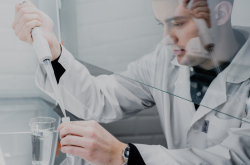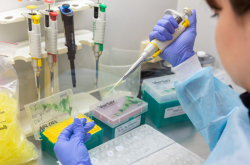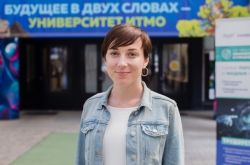Anastasia Pavlova, a teacher at ITMO’s Faculty of Food Biotechnologies and Engineering’s
The CREA-RE-RU project is the result of many years of intense collaboration between ITMO University, Gävle University College (Sweden), Lahti University of Applied Sciences (Finland), and the University of Latvia. The idea was initiated by Olga Sergienko, an assistant professor at ITMO’s Faculty of Food Biotechnologies and Engineering, who wanted to develop the already existing educational program in the field of cradle-to-cradle economy in order to give students the opportunity to work on real projects.
The project will last for two years (four semesters). Every semester, four students will be given the chance to go abroad and work in an international team. This year, two Bachelor’s and two Master’s students from ITMO University went to Latvia where, together with students from Sweden, Finland, and Latvia, they listened to lectures by leading Latvian professors and visited four industrial plants: EcoBaltica plastic recycling company, Fortum thermal power station, ZAAO waste recycling plant, and Valmiermuiza brewery.

What makes this project truly special is that students are given real-life tasks to work on. During the following two months, they will share knowledge and experience, learn to defend their ideas, and communicate with business representatives. In December, they will return to Riga to present the results of their work to each other and to the project’s coordinators.
Next semester, the course will take place at Gävle University College (Sweden), and then at Lahti University of Applied Sciences (Finland), while in 2020, the event will be held in St. Petersburg. I think that this project is a great example of collaboration between science and business.
Anastasia Borisova, a Master’s student

My group’s industrial partner is Fortum thermal power station. As part of our business case, we have to determine how efficiently the resources are used at the station and come up with suggestions on how to improve the situation and use waste more effectively. Over the next two months, we will have to study in detail how the station works, familiarize ourselves with the latest technologies in the field of sustainable waste management, and come up with solutions for the problem. Apart from that, Fortum invited us to think about reusing coal ash as one of the ways to achieve one of their key goals, zero-waste production.
Our team is made up of students from all the four countries, which I think is really wise, as we can discuss the best practices of our countries and combine them.
In addition to working together, each of us has their own set of tasks to perform; for example, someone will study new ways to achieve operational excellence, while others will think about the plant’s development prospects. We’ll discuss provisional results on Facebook and WhatsApp and share them with our coordinator from the University of Latvia.

I decided to take part in this project because I wanted to get some first-hand experience in this field. If not now, then when? Of course, it’s much easier to listen to lectures and read science books, but I know that at this stage, theoretical knowledge it’s not exactly what I need.
My Bachelor’s degree was in chemical technologies, but I’ve always been interested in environmental protection issues. That’s why I decided to continue my studies here, at ITMO. And I’m even more motivated now when I’m given this amazing opportunity to visit the leading production plants in the field of sustainable development and share experience with researchers from other countries. Of all the enterprises we visited in Latvia, ZAAO waste recycling plant impressed me the most. The company’s representatives told us about their newest biogas and wastewater treatment technologies, as well as their awareness-building efforts. There are ecological routes on the plant’s territory; their educational center hosts various seminars and workshops for those interested in ecology. There is even a beautiful forest nearby where you can pick mushrooms and berries.
What I also liked about Latvia is their social advertising; there are ads encouraging people to sort their waste, for example. I think that it would be great to make the same advertisements here, in Russia. The CREA-RE-RU project is a real challenge for me, but it’s definitely worth it.
Anastasia Malchenko, a Bachelor’s student

This is not my first time taking part in such projects, and I’m really grateful to my university for all the opportunities it offers. Last year, I participated in a winter school in Finland, where I presented my research on construction waste management in Russia. Besides, I also went to Germany to talk about electric cars. As for this trip to Riga, for me, it was a chance to acquire new knowledge, meet new people, learn about the latest technologies and broaden my horizon.
I really enjoyed the trip; it was both informative and entertaining, and very well-organized. The schedule was so tight that we didn’t always have time to walk in the legendary Old Town. What was also good was that I didn’t experience a language barrier at all, as we all had very good English, while Latvian students easily switched to Russian. Now we’re actively communicating with other students via social media; we have phone conferences scheduled every week.
I really like such projects, I enjoy creating something new and perfecting something that’s already done, and I think that that’s what such projects are aimed at. I hope that participating in this project will help me acquire new skills that will allow me to further develop a closed loop economy in Russia.




